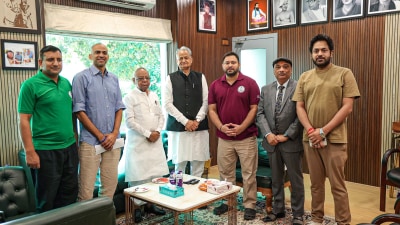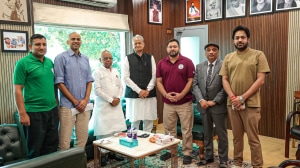Afghans pick Upper House leader, undecided on Lower
A day after the inauguration of Afghanistan’s first Parliament in decades, lawmakers today picked an ex-President to head the Upper Hou...

A day after the inauguration of Afghanistan’s first Parliament in decades, lawmakers today picked an ex-President to head the Upper House, but squabbled over how to choose the influential leader of the Lower House.
Elusive Taliban leader Mullah Mohammad Omar, meanwhile, issued a rare statement, denouncing the new legislature as “bogus” and a means for the US to consolidate its grip on the country. He vowed to step up resistance.
Sibghatullah Mojadidi, President of the first Mujahideen (holy warrior) government of the early 1990s, was picked to head the 102-seat Upper House, or Meshrano Jirga (Elders’ Assembly), a spokeswoman for Parliament’s secretariat said.
Mojadidi, a close ally of President Hamid Karzai and seen as a moderate, will serve for the five-year term of the parliament.
Amid emotional opening exchanges in the Lower House, deputies disagreed on how to choose a house leader, but agreed to discuss the issue on Wednesday, pro-Karzai lawmaker Khalid Pashtun said.
He described the session as very “emotional”, with “lots of objections and criticisms” and every one trying to speak at once. He said 27-year-old woman MP Malalai Joya, an outspoken critic of former warlords who secured Assembly seats, was shouted down when she tried to read a statement.
On Monday, self-styled Opposition leader Yunus Qanuni— a former factional official whose forces have been accused of abuses—dismissed concerns about warlords, saying the term was outmoded and the popular vote should be respected. His comment appeared to underline fears that some MPs would try to block bids to bring war criminals to justice. Parliament has the right to approve or reject legislation and government decrees, and to endorse members of Karzai’s cabinet.
Analysts say Karzai appears to have enough support in Parliament to avoid major problems, but could face difficulties with appointments given the disappointment at his administration’s failure to improve people’s lives and carry out crucial reforms.
Officials said on Monday Karzai was considering reshuffling his cabinet and shrinking its size from 27 ministries. —Reuters






- 01
- 02
- 03
- 04
- 05

























